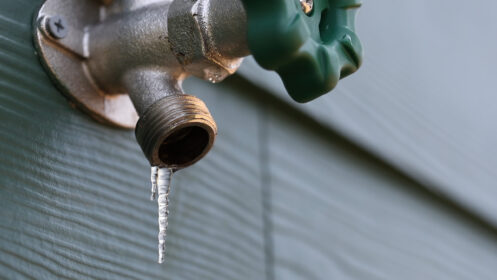
When winter blankets Maine in icy temperatures, homeowners must be wary of a common yet serious threat: frozen pipes. Falling temperatures can cause water inside pipes to freeze, causing blockages and potentially costly damage when the ice thaws.
Causes of Frozen Pipes
Frozen pipes are most commonly caused by extreme cold weather, especially when temperatures drop below freezing for extended periods. When water inside pipes reaches 32 degrees Fahrenheit or lower, it can freeze, causing blockages and possible bursts. One common cause is insufficient insulation. Pipes in unheated areas, such as basements, attics, or crawl spaces, are especially susceptible. For example, if you have plumbing running along an exterior wall that is not properly insulated, the cold air can chill the pipes, increasing the risk of freezing.
Another important factor is the ice buildup in pipes already partly blocked by mineral deposits or debris. The water flow is slowed down by this blockage, which makes it easier for the water to freeze. Also, drafts from doors, windows, or vents can make the area around pipes cooler, especially those that are on the outside of walls. In this case, if there are holes or cracks in the walls near the plumbing, cold air can get in and cool the pipes down quickly.
Essential Tips to Prevent Frozen Pipes
First, insulate the pipes likely to freeze in places like basements and attics that aren’t heated. Use fiberglass sleeves or foam pipe insulation to cover pipes that are showing, especially those that are outside walls. Also, make sure your home has enough heat when it gets cold. Maintain a consistent temperature, ideally above 55 degrees even when you are away.
Let faucets drip in frigid weather; moving water is less likely to freeze. When temperatures plummet, open cabinet doors under sinks to allow warm air to circulate around the plumbing. To protect exterior plumbing from freezing temperatures, disconnect and drain hoses and use insulated covers for outdoor faucets.
Sealing gaps and cracks in walls, windows, and doors is critical for preventing drafts. Consider using caulk or foam sealant around pipe entrances to prevent cold air infiltration. Regularly inspecting your heating system and ensuring that it operates efficiently will further protect against frozen pipes, so schedule routine maintenance before winter arrives.
Signs Your Pipes May Be Freezing
A drop in water pressure is one of the most common signs that your pipes may be freezing. If the faucet only drips when you turn it on, it could mean that ice is blocking the water flow in the pipes. Also, if you hear strange sounds like gurgling or banging, ice could be forming, putting pressure on the water flow.
If a faucet only gives out cold water and not hot water, this could also mean that the hot water supply lines are freezing. There may also be frost on the outside of pipes, especially in unheated places like crawl spaces or basements.
Another important sign is water pooling around the foundation or under sinks, which could mean a pipe has burst. Lastly, if your pipes are draining more slowly than usual, ice buildup might be to blame.
When to Call a Professional Plumber for Help
Call a professional plumber right away if you hear strange noises or notice that water flow is slowing down because your pipes are frozen. For example, if your faucets are only dripping or not giving you any water, the water has likely frozen and blocked the pipe. In addition, you should call a plumber immediately if you think a pipe has burst because of sudden water pooling or a big drop in water pressure.
If you have persistent low water pressure, strange damp spots on walls or ceilings, or have tried do-it-yourself solutions that have yet to work, you should also call a plumber. Professionals can accurately evaluate the situation and put in place effective solutions to stop more damage and repairs that cost a lot of money.
Contact Us Today
Don’t let Brunswick’s harsh winters catch you off guard! Taking important steps like insulating your pipes, letting your faucets drip, and making sure your home is properly heated can greatly lower the risk of freezing. We can help with those jobs and more, including furnace repair and installation, boiler repair and installation, AC repairs, drain cleaning, water heater repairs, and duct cleaning. Need assistance? Contact Dog House today for expert plumbing services to protect your home from frozen pipes. Call now to schedule your winterization check.













